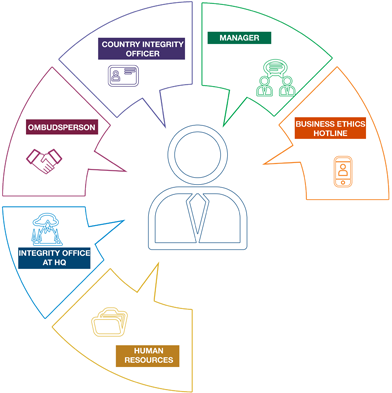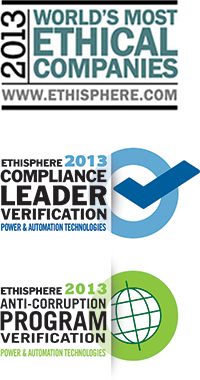A prerequisite for doing business

ABB’s technology makes a major contribution to businesses and communities around the world. However, it is not only what we do, but how we do it that determines our reputation with stakeholders and ensures our continued success.
ABB sets high standards of integrity, which are expected of every employee in every country where we do business. We use a systematic approach, supported by tools and processes, to embed integrity in the organization and apply a zero tolerance policy for violations.
Standards of business conduct
The ABB Code of Conduct is the integrity framework that describes the behavior expected of employees and stakeholders. The Code of Conduct contains practical instructions to help employees in their day-to-day work and has been translated into 45 languages to ensure it is accessible to everyone at ABB.
The Code of Conduct is underpinned by a strong set of internal standards and policies that provide specific guidelines for implementing the Code in daily activities. These directives cover issues such as bribery and corruption; gifts, entertainment and expenses; appointment of ABB representatives; political and charitable contributions; agreements with subcontractors and consortium partners; and mergers and acquisitions due diligence.
A series of anti-trust guidance notes complement these directives. These guidance notes, along with the key elements of our integrity standards and policies, are publicly available on our website.
Educating and empowering our employees
All current and new employees are required to take Code of Conduct face-to-face and e-learning training. Basic and advanced training sessions cover the ABB integrity directives, including anti-bribery and anti-trust issues. A range of case studies illustrate both desirable and undesirable behaviors and highlight the various reporting channels available to employees. Code of Conduct training is also a key element of post-acquisition integration activities.
In January 2012, ABB embarked upon a new global, face-to-face integrity training program for all employees, covering a variety of risk areas such as anti-bribery and anti-trust. By the end of April 2013, a total of 147,000 employees had completed the training, representing approximately 99 percent of all ABB employees worldwide.
99% of employees worldwide received face-to-face integrity training
We also delivered a new face-to-face anti-trust training program for targeted employees from June 2012 until the end of September 2013. More than 25,000 employees were trained on competitive intelligence gathering versus commercially sensitive information exchanges, and nearly 22,000 employees received training related to trade associations.
Prevention and detection
ABB also maintains additional programs to prevent non-compliant behavior and to detect integrity concerns. Anti-bribery reviews of business units and countries are conducted throughout the year by ABB’s internal audit department. In these reviews, the auditors review business processes, accounts and balances, and test transactions to assess the robustness of controls and identify possible violations of ABB’s anti-bribery procedures.
We also conduct internal surveys to understand employee attitudes, awareness and perceptions of integrity at ABB, and develop enhanced integrity processes to address certain areas with greater compliance risk.
During July 2013 a global Integrity Culture and Risk Survey was conducted by the professional services firm KPMG AG. Over 24,000 employees responded to the survey, which measured integrity on eight dimensions: clarity, role modeling, enabling environment, support of employees for Integrity, transparency, openness to discuss dilemmas, comfort to report misconduct, and enforcement. The outcome confirmed that ABB has a strong ethical culture, that our communication and training efforts have resonated in the organization, and that the vast majority of employees would report if they saw a concern. Read more in our case study.
Multiple channels are available to all employees to report integrity concerns. A multilingual business ethics hotline, run by a third party, is available 24 hours a day, seven days a week. Calls are treated confidentially and people with information can choose to remain anonymous. A stakeholder hotline is available to our external business partners. More details on our reporting channels are available on our website.
ABB also has an Ombuds program as an additional route for integrity reporting. This program was expanded during 2013, with over 75 trained Ombuds persons now available in just over 50 countries. The ABB Ombuds persons are respected, experienced business colleagues who agree to fulfil this additional role to their daily work, and who are available for discussion and to provide confidential guidance.
Overall, the ABB integrity program is supported by a team of approximately 500 employees, full-time and part-time, at headquarters and around the world.

ABB investigates all potential integrity concerns and cooperates fully with law enforcement agencies. There is a strict zero tolerance policy for violations of the law or the ABB Code of Conduct, which is enforced through systematic disciplinary actions.
External recognition

In March 2013 ABB was named by the Ethisphere Institute, a leading international organization dedicated to best practices in business ethics, to its 2013 list of the world’s most ethical companies. ABB was recognized because of its demonstrated leadership in ethical business practices according to the Ethisphere Institute. Ethisphere also awarded ABB with two seals: Compliance Leader Verification and Anti-Corruption Program Verification.
Ethisphere recognizes organizations that have made the decision to proactively invest in compliance, thereby sending a clear signal to key stakeholders that their company takes its commitment to compliance and ethics seriously. Ethisphere’s Anti-Corruption Program Verification offers objective, independent verification of a company’s anti-corruption program and initiatives, including a comprehensive review of policies, procedures, training, communication, controls, and enforcement. Anti-Corruption Program Verification can only be earned by companies that are able to prove they have designed, implemented, and enforced a robust, best-in-class anti-corruption program that is capable of reasonably detecting and preventing bribery and corruption.